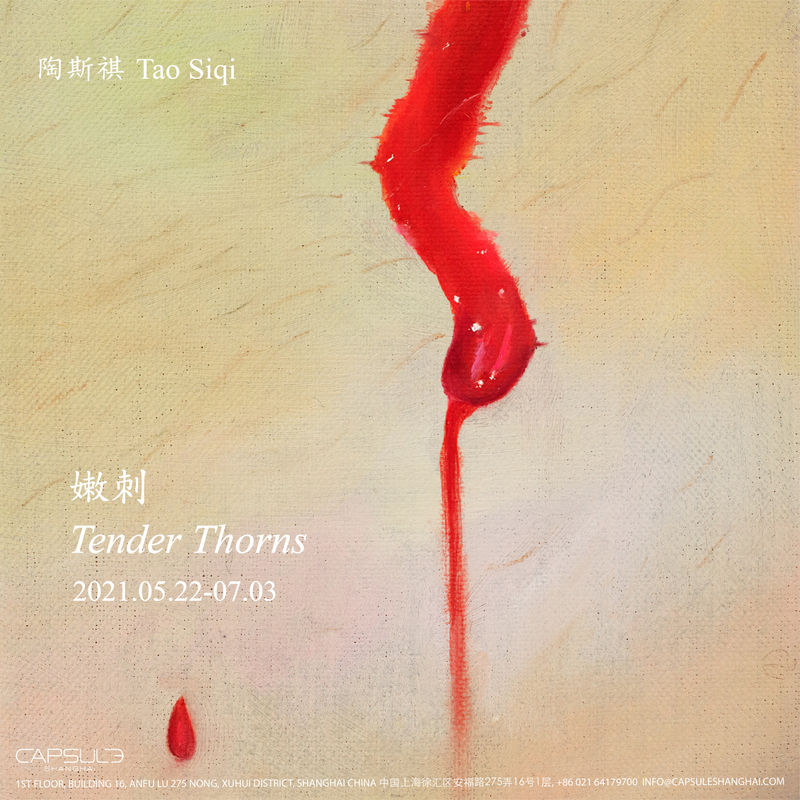Capsule Shanghai is delighted to present “Tender Thorns,” artist Tao Siqi’s first solo exhibition at the gallery, comprised of Tao's most recent works on canvas. The show will run from May 22nd to July 3rd, 2021.
Capturing transient feelings and emotions through imageries imbued with metaphors, Tao Siqi’s artworks embody what Spinoza defined as the three basic human emotions that drive passion, namely, pain, pleasure, and desire. Be it for the photographs from her student years or her most recent oil paintings in large or small dimensions, Tao adopts various visual resources ranging from film scenes and found digital images to convey the complexity of human eros. Her works on view in this exhibition can be roughly divided into two types: those depicting the transcendental signifiers charged with erotic desires, such as a pistol, a sweet and gentle animal, a snowman, the hazy landscape; those zooming in on the body’s receptive channels in a passionate situation, such as the tongue, hands, skin, and lips in contact with other objects and body parts. Once the pictorial language triggers a bodily response, one’s mind would subconsciously make such an association. It is a human instinct to desire. The complexity of the human heart and mind is none other than countless hybrids of reasons and impulses, which transform according to the changing circumstances.
The title, "Tender Thorns" describes the visual tension of Tao Siqi’s paintings. Every piece is an amalgamation of rosy colors, soft tones, and delicate depictions counterbalanced with the physical sensations of danger, excitement, and pain, complicating the nature of eroticism in an age of innocence. It is not difficult to imagine that Tao Siqi’s works were published as book covers of a series of Chinese translations of Junichi Watanabe’s famous novels. Unlike how many of Watanabe’s plots develop, where the protagonists often sought death to preserve their undying love for each other, Tao Siqi’s scenes encapsulate a sense of intimacy, innocence, and ambiguity that dissolve any suggestions of ethical values. At the same time, the artist articulates the nature of fleeting intimacies and longings, balancing the three basic emotions mentioned above while introducing external factors from the outside world to enrich those feelings and emotions. Many of her images, such as Wipe (2021), Bite the Ear (2020), and The Art of Rope (2020) present a state of imminence akin to Fritz Lang's films that magnifies the sensory experiences to allow for imagination of violence without the actual act. In Tao Siqi’s case, her works aim for a state of suspense that teases a psychological response, inflating the id with impulses that would trigger the mind to imagine one's own passionate and erotic endeavors.
With more than a few dozen paintings on view, these works of art are like scenes of a film or chapters of a novel, deflecting into evocative narratives, in a linear or non-linear fashion, through the prism of human perception. As Roland Barthes suggests in The Lover’s Discourse, the perceptions and insights of love stories are fundamentally fragmented and incoherent. Lovers are often completely thoughtful and disorganized, and the ideas are often fleeting. Tao Siqi pours her emotional experiences and journeys into her works, blending impulse with reason, putting her viewers into a dream-like situation such as Zhuangzi's dream of the butterfly.
Despite a growing tendency to define gender specificity and sexuality in recent years, many societies continue to silence the voices on gender issues. Informed with the current conditions we live in, Tao Siqi’s works transcend the discourse of sexual politics; instead, she focuses on exploring the pictorial potentials that would allow viewers to discover, reflect and express their own pain, pleasure, and desire.
Text: Fiona He



